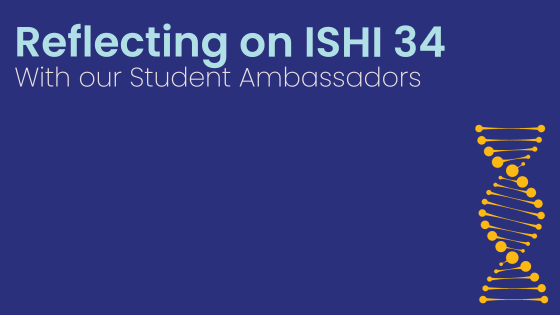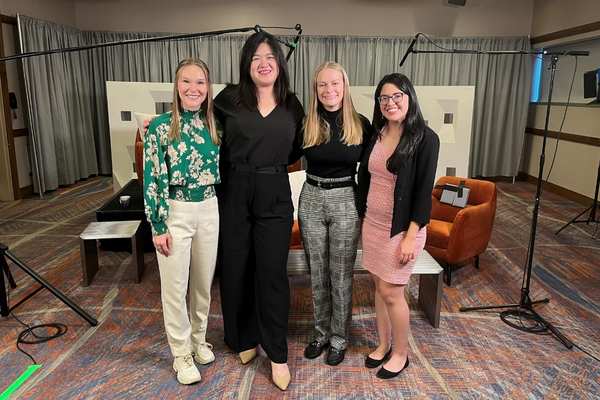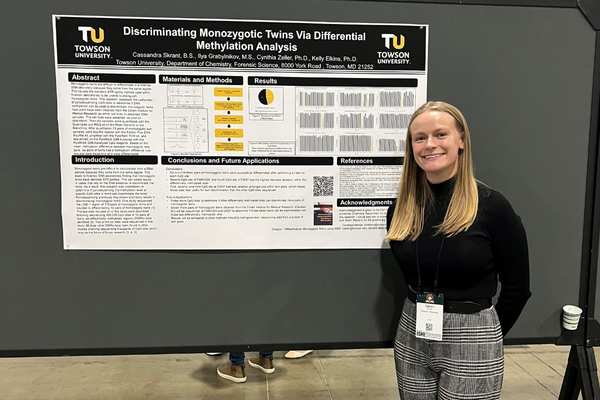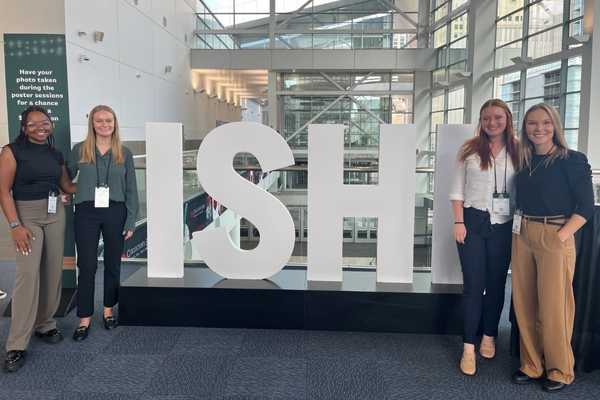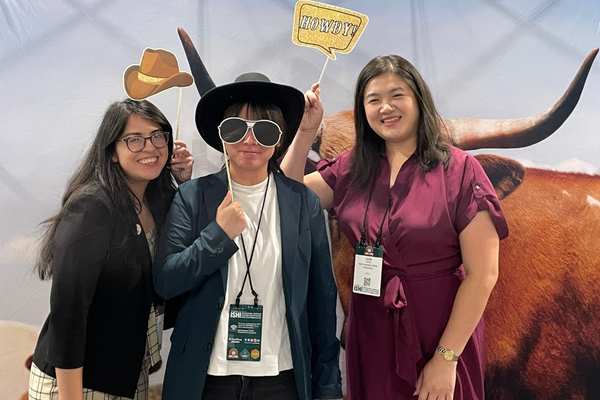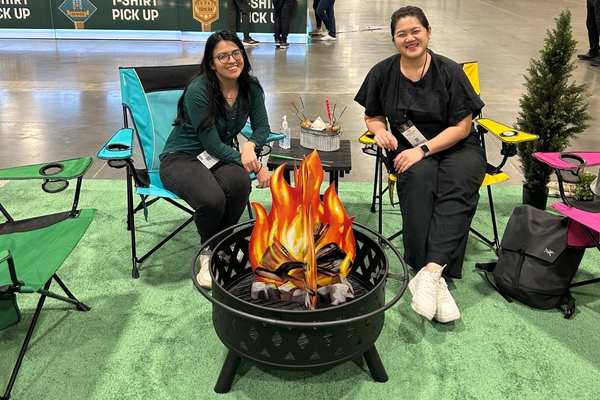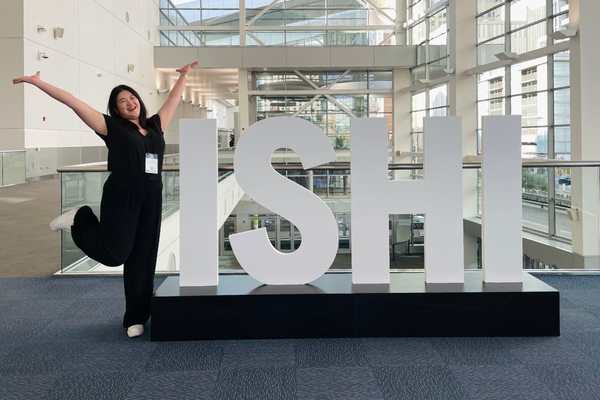Three years after a fully virtual symposium in 2020, it’s safe to say that the 34th International Symposium on Human Identification felt like a return to normalcy. With attendance reaching near record levels, including nearly 1/3 of attendees coming for the first time, it was great to see so many of you in the fill the Hyatt Regency and Colorado Convention Center in Denver from September 18-21, 2023.
Topics such as burnout and resiliency are not often spoken about in forensic DNA. This year’s keynote, Allison Massari, taught those in the audience the potent life lessons that she learned on each step of her path after she was severely burned in a fire and faced seemingly insurmountable odds and provided actionable steps that can be taken to improve personal resiliency.
Julie Weil, a sexual assault survivor and global activist, shared her story of how she persevered after her assault and continues to work to turn victims into strong survivors by championing for change in the way survivors of sexual assault are treated in the system.
Forensic Investigative Genetic Genealogy continues to be a topic of interest with presentations focused on standards for the field and how the technique should be used going forward. Our expert panel discussed considerations in genetic privacy within the DNA field.
Other topics included implementing Rapid DNA, emerging technologies in the field, massively parallel sequencing, a closer look at the MMIP/MMIW crisis and much more.
Among the newer faces were our four Student Ambassadors, Julia, Beighley, Cassie and Kayli. Below, they reflect on their time at the conference.
What were your first impressions of the conference?
Julia Wang: My initial impressions of ISHI were centered on the warm and enthusiastic atmosphere throughout the workshops. It was inspiring to be surrounded by practitioners so eager to expand their expertise. My aspiration is to make meaningful contributions to the work of crime labs, and observing the dedication to enhancing practitioner knowledge gave me a sense of optimism.
Beighley Ayers: I had an amazing time at ISHI. I had heard great things prior to coming from our professors and previous students who attended the meeting, and it did not disappoint all the expectations! We had such a great group from Towson University attend which was super fun, and I loved getting to know the other ambassadors from Sam Houston University.
Cassie Skrant: At first, I was shocked by how many people were in attendance. My graduate program is rather small, so I never thought about how many people are interested in human identification throughout the world. As the conference went on, I saw how collaborative and friendly the environment was, even when discussing certain controversial issues within forensic science and human identification. Every individual, no matter how well educated and accomplished, was so kind and open to having a discussion. It really made me so hopeful for the future of forensic science and how it will continue to improve because of conferences like ISHI.
Kayli Carrillo: My initial reaction upon attending ISHI was a mixture of intimidation and exhilaration. It was awe-inspiring to witness the sheer number of attendees gathered for this conference. There was a diverse range of students and professionals from varying backgrounds, which was so exciting to see.
How does ISHI compare to other meetings you’ve been to?
Julia: To me, ISHI is the perfectly sized HID and DNA-focused conference. ISHI seamlessly combines a diverse range of presentations, offering an opportunity to explore the cutting-edge advancements in forensic DNA within crime labs and research.
Beighley: I have been to a couple other scientific meetings, but ISHI tops them both. ISHI felt like such a celebration of all the hard work we put into our research. I also liked that it was all centered around DNA.
Cassie: Before ISHI, I attended MAAFS which was a short drive away from Towson. At MAAFS, I met multiple local agencies, which was amazing to make some new connections near Towson. Even though MAAFS had a lot to offer for local connections, ISHI provided me the opportunity to meet individuals from all over the world. Having attendees and speakers from various parts of the world really helped me make connections around the world and hear different opinions.
Kayli: Previous conferences I’ve attended primarily revolved around smaller, DNA-specific, and/or interdisciplinary forensics focuses. ISHI was the largest DNA-specific conference I have ever attended, and attendees were not only from across the country but from all corners of the world. Witnessing professionals and enthusiasts from diverse backgrounds showed the strength of the international forensic community and their passion for advancing the field.
What was your favorite part of the conference?
Julia: My favorite part of the conference was attending the workshops and meeting people from labs across the globe. Hearing these diverse perspectives helped me greatly to understand the relevance of my current research projects and to brainstorm on future needs.
Beighley: My favorite part of the conference would probably be the night at the Denver Science Museum. It was special to have the entire museum shut down to the public and just allow ISHI attendees to be there. The exhibits were cool and of course, there were some excellent dance moves on the dance floor.
Cassie: I think my favorite part of the meeting was the portion at the Denver Science Museum. Not only was it fun to go around the exhibits and see mummies, but it was also great to see professionals and intelligent individuals let loose and have some fun. I also found this night a great way to make connections in a very comfortable and casual setting where you can learn more about what a person is truly like inside and outside the office.
Kayli: The most enjoyable part of the conference for me was meeting new people and making new connections. I loved meeting other fellow students who shared my enthusiasm for the field, and I hope to see them at future conferences. I also enjoyed speaking to professionals who had so much knowledge that they were so excited to share with me, which helped broaden my understanding.
Did you make any new connections with attendees that will assist in your research?
Julia: During the workshops and poster sessions, I had the privilege of having some enlightening conversations with DNA analysts from different crime labs. These interactions provided me with a deeper understanding of the needs and hurdles they face while working in the lab. Considering my dissertation focuses on sexual assault, I also received some helpful feedback and words of encouragement from experts who are passionately committed to improving the analysis of sexual assault evidence.
Beighley: I actually did speak with an individual at a lab where we discussed a way to collaborate to further test my body fluids assay. I do not want to provide any spoilers yet but I think the connection and opportunity could be really exciting.
Cassie: As a student ambassador, we hosted the Young Scientist Showcase. One of the presentations was on pyrosequencing. His presentation was very informative, and it was interesting to see other ways pyrosequencing can be implemented in forensic human identification. I also met an individual who performed twin research and enlightened me on other methods to differentiate monozygotic twins. Both experiences helped me broaden my knowledge on twin discrimination and pyrosequencing.
Kayli: During one of the table talk lunches, I had the pleasure of talking with Dr. Douglas Hares from the FBI, who is spearheading the implementation of Rapid DNA. One of my upcoming research projects involves the application of the RapidHIT for DVI (Disaster Victim Identification) samples. This was truly an enlightening discussion about the future of RapidHIT.
Also, the poster sessions provided networking opportunities. I was able to connect with researchers from UNT Health Science Center who are actively conducting research with the RapidHIT instrument. Their experiences and insights about the instrument will be beneficial for when I start my project.
An additional project I will be working on will involve the use of Diamond Dye to visualize DNA. One poster described the use of Diamond Dye, and I was able to gain advice on working with the product.
What is one thing that you learned while at ISHI?
Julia: I gained valuable insights into the practical applications of likelihood ratios and explored more advanced propositions than what I’ve encountered in the classroom. It was especially enlightening to learn how to formulate compound and complex propositions involving related individuals. I’m grateful for the numerous examples, exercises, and engaging discussions that enriched the workshop experience.
Beighley: It is hard to share just one thing I learned at ISHI because I felt like a sponge taking in fascinating information each day. I did learn of many new companies and labs that I was not aware of before for potential places to apply for jobs soon. I also learned so much at each workshop, especially at the FIGG workshop with the interactive mock case we worked on.
Cassie: Before this conference I said that I wanted to learn more about forensic investigative genetic genealogy. After attending this conference, I learned way more about forensic investigative genetic genealogy than I ever would have thought. The interactive workshop by Alison Wilde, Wendy McLean, and Claire Glynn was so fun. I loved the interactive component because it really helped me learn the entire process and all the resources available to make FIGG possible.
Kayli: A valuable lesson I learned at ISHI pertains to the intricate relationship between legislation and forensics, particularly in the context of FIGG and Rapid DNA applications. FIGG has steadily increased in popularity and potential over the years, but there are legal considerations that must be addressed, especially with ethics. This pivotal role that policy plays in the successful implementation of forensic applications is sometimes overlooked, but listening to the talks demonstrated its importance.
Do you have advice for other students considering attending ISHI?
Julia: Apply for ISHI Student Ambassador! Even if you don’t get selected the first time, apply again! This was my second attempt at becoming an Ambassador, and I am thrilled to have persisted. Thanks to this role, I had the chance to connect with more people and participate in workshops that I had not encountered at other conferences.
Don’t hesitate to strike up conversations or ask questions. Everyone was friendly and approachable!
When the dress code is “dancing shoes”, they mean it!
Beighley: Talk! Go up and talk to vendors, forensic scientists, other students, attorneys, and anyone else you can find. You never know where the connections will take you one day.
Cassie: Talk to as many people as possible. Everyone is so kind and knowledgeable that you will always learn something new. Forensic science and research involving human identification can include multiple different areas of knowledge. It is impossible to be an expert in every area of forensic science, so it is best to use these conferences to listen and learn from some real experts so that you can apply it to your own research or job.
Kayli: While it may be intimidating to talk with new people, ISHI provides a unique opportunity to connect with others. I would encourage students to seize the opportunity to network with as many individuals as possible. Everyone is supportive and welcoming to answer any questions. Embrace all the opportunities available, try to step out of your comfort zone, and approach the conference with an open mind – you won’t regret it!
What are your biggest takeaways from this year’s conference?
Julia: Rapid DNA technology is making strides in its expansion into booking stations.
Forensic Investigative Genetic Genealogy is evolving from a “miracle” tool to a practical tool thanks to the collaborative effort of the genealogy and forensic DNA communities.
Beighley: One of the things I took away from ISHI is that all the people I follow on LinkedIn or know of in the forensic community are people too. Sometimes we look up to people and feel intimated or have this perception they are different than normal people, but at the conference, everyone was incredibly nice and approachable. It made me feel more comfortable knowing everyone around me were “normal” people too. That helped me gain confidence that I can have a successful career and reach my goals just like all the impressive people I was fortunate enough to be around all week at ISHI.
Cassie: My biggest takeaway is that forensic science is constantly changing. The work forensic scientists perform can have a major impact on people’s lives, so it is important that the best and most up-to-date lab work is performed.
Kayli: The sense of collaboration within the forensic field is truly evident. There is a vast reservoir of knowledge that can be shared among peers, and the pursuit of learning is a continuous journey, regardless of one’s experience. The impactful presentation by Julie Weil demonstrated the real-life impact that work and research within the field directly impact lives. This realization carries a considerable weight of responsibility. Nevertheless, it serves as a constant reminder of the need for self-care and resilience, as keynote speaker Allison Massari mentioned, to ensure that we are working to the best of our capabilities.
Anything else you’d like to share?
Julia: Thanks for letting me be a student ambassador! I had a fantastic time and am excited to see everyone in San Antonio next year!
Beighley: I sincerely want to thank ISHI and Promega for not only putting on this tremendous event but also allowing me and the other three ambassadors the opportunity to be part of it. I loved hearing all the talks and meeting so many people from around the U.S. and the world. I have made many valuable connections. This would not have been possible without the support from Towson University and Dr. Cynthia Zeller. I am so grateful I got to attend ISHI this year, and I hope to be back one day!
Cassie: I would just like to thank Promega for choosing me to be a student ambassador and providing me with so many opportunities to share my research and make connections with some lovely people.
Kayli: I would just like to thank ISHI for allowing me the incredible opportunity to be a student ambassador. My experience was immensely enriching, from the people I met to the knowledge I gained. ISHI 33 is definitely an experience I will never forget. I can’t wait to see everyone next year in San Antonio!
We will begin accepting applications for our next batch of Student Ambassadors in February 2024. If you are interested in applying, be sure to add your name to our mailing list.
WOULD YOU LIKE TO SEE MORE ARTICLES LIKE THIS? SUBSCRIBE TO THE ISHI BLOG BELOW!
SUBSCRIBE NOW!

